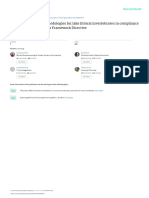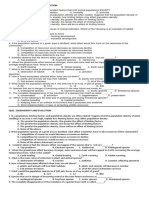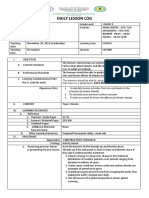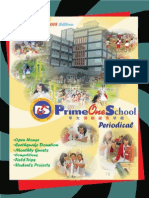GIAN Course IIT Kanpur
GIAN Course IIT Kanpur
Uploaded by
MANISHCopyright:
Available Formats
GIAN Course IIT Kanpur
GIAN Course IIT Kanpur
Uploaded by
MANISHCopyright
Available Formats
Share this document
Did you find this document useful?
Is this content inappropriate?
Copyright:
Available Formats
GIAN Course IIT Kanpur
GIAN Course IIT Kanpur
Uploaded by
MANISHCopyright:
Available Formats
Geochemical Monitoring of Rivers – Theory, Practice, and Data
Interpretation
Date: 22/11 to 27/11/2018
Venue: IIT Kanpur
Overview
Global warming and environmental change are adversely affecting the environmental health
of river ecosystems, which provide water and food security to billions of people on Earth.
Questions and concerns have been raised about future river flows and water resources, impacts of
urbanization and deforestation on river ecosystem health, effects of rapid industrialization,
discharge of industrial effluents, sewage and agricultural runoff on river ecology, and the
repercussions that construction of dams, barrages, and other anthropogenic interventions have on
the overall health of rivers. Ongoing changes can only be fully understood if time-series data on
these fragile ecosystems are collected in a systematic way. One of the best ways to monitor rivers
is to study river water chemistry, which responds to processes occurring in rivers’ watersheds. The
isotopic composition of the water molecule provides insights into sources of water within a
watershed, whereas the chemical and isotopic composition of river water reflects interactions of the
hydrologic cycle with the natural or anthropogenically altered land surface.
This short course on Geochemical Monitoring of Rivers – Theory, Practice, and Data
Interpretation focuses on the fundamental principles and processes that govern river water
chemistry and how river water chemistry can be used to understand the impact of climate change
and anthropogenic interventions on river flow and water composition. In addition, the course will
have strong laboratory- and field-based components. We will introduce important parameters of
river monitoring such as river discharge measurements, suspended sediment and bed load sampling,
as well as basic field measurements of physical and chemical parameters. This course will also
provide hands-on training on several state-of-the-art analytical instruments such as Quadrupole
Inductively Coupled Plasma Mass Spectrometer (Q-ICPMS) and will teach participants the skills of
measuring major and trace element concentrations, oxygen and hydrogen isotopic composition of
water molecules as well as interpretation and reporting of geochemical data. Successful completion
of the course will enable participants to understand the fundamental principles of river
geochemistry, and equip them with knowledge of sediment and water sampling techniques. The
focus on taking appropriate samples, making sound field and laboratory analyses, as well as
interpreting geochemical data will enable participants to integrate geochemical information with the
goal of understanding watershed processes.
Objectives
The primary objectives of the course are as follows:
i) Exposing participants to the fundamentals of river biogeochemistry
ii) Teach various river sampling and in-situ sensing techniques (field based)
iii) Hands-on introduction to analytical instrumentation that can be used to measure chemical com-
position of river water (laboratory based)
iv) Teach participants on how to use river water chemistry to understand watershed processes
v) Provide exposure on how to study a problem and devise solutions through case study and live
project
Course Details
Day 1
Lecture 1: 9:30 to 10:30 AM
Introduction to aqeous geochemistry. This lecture provides an introduction to the chemical and
mineralogical structure of Earth, as well as the origin and properties of elements and their
isotopes. Earth’s surface processes, the chemical evolution of Earth’s surface and how it has
affected the chemical evolution of surface waters.
Lecture 2: 10:30 to 11:30 AM
Fundamentals of isotope geochemistry. We introduce participants to the origin and properties of
isotopes as well as processes that lead to natural variability in isotope abundance.
LUNCH BREAK
Lecture 3: 2:00 to 3:00 PM
In this lecture we will introduce participants to the wide spectrum of rivers and river
biogeochemistry.
Lecture 4: 3:00 to 4:00 PM
Application of radiogenic isotopes in river science. This lecture focuses on the utility of
radionuclides with long and short half lifes in river biogeochemistry.
Day 2
Lecture 5: 9:30 to 10:30 AM
Application of stable isotopes in river science.
Lecture 6: 10:30 to 11:30 AM
The water cycle. This lecture will highlight the role rivers play in the global water cycle. River
hydrology and related measurements.
LUNCH BREAK
Laboratory 1: 2:00 to 5:00 PM
Field visit: Monitoring the river.
Day 3
Lecture 7: 9:30 to 10:30 AM
Biogeochemical composition of the dissolved load and strategies to sample it in representative
fashion.
Lecture 8: 10:30 to 11:30 AM
Geochemical and mineralogical composition of the particulate load and sediment transport.
LUNCH BREAK
Laboratory 2: 2:00 to 5:00 PM
Chemical composition of water samples: Various geochemical measurements using various IIT
Kanpur facilities. This lab will be assisted by trained technicians and volunteer students.
Day 4
Lecture 9: 9:30 to 10:30 AM
Introduction to river monitoring instrumentations and related chemical and physical principles.
Lecture 10: 10:30 to 11:30 AM
Fundamentals of making sound analytical measurements, including methods for quantifying
elemental concentrations (standard calibration curve, standard addition, isotope dilution) and
isotope ratios.
LUNCH BREAK
Laboratory 3: 2:00 to 5:00 PM
Data reduction techniques using Microsoft Excel. Real data sets will be used to introduce
participants to the data reduction process. Integration of generated data. Best practice of
reporting geochemical data. How to properly archive datasets.
Day 5
Lecture 11: 9:30 to 10:30 AM
Interpretation of the data.
Final Exam: 11:00 AM onwards
[No class on Sunday]
Teaching Faculty
6.1: CV of Dr. Bernhard Peucker-Ehrenbrink
Dr. Bernhard Peucker-Ehrenbrink is the co-Director of the Global
Rivers Observatory (globalrivers.org), a global collaborative network of
time-series observatories on large rivers. The Global Rivers
Observatory is presently observing large rivers in 5 different continents
and studying how climate change, deforestation, and other disturbances
are impacting river chemistry and land-ocean linkages. Dr. Peucker-
Ehrenbrink received his PhD in geochemistry in 1994 from the Max-
Planck Institute for Chemistry and the Johannes Gutenberg-University
in Mainz, Germany, before joining the Woods Hole Oceanographic
Institution (WHOI) as a postdoctoral scholar. He is also a Senior
Scientist and J. Seward Johnson Chair in Oceanography (Education
Coordinator) in WHOI’s Department of Marine Chemistry and Geochemistry. Peucker-Ehrenbrink
teaches Marine Isotope Geochemistry in the MIT/WHOI Joint Program in Oceanography and
Ocean Engineering. His research interests in geology and geochemistry are broad, and for the past
decade have focused on the biogeochemistry and sediment transport of global river systems and
their relation to the changing chemistry of seawater. He has published 75 peer-reviewed articles,
including multiple papers in high-impact Science and Nature journals, and nearly 185 conference
abstracts. His research is widely cited (Web of Science h-index: 31). He has also edited a book on
the Accretion of Extraterrestrial Matter throughout Earth’s History.
6.2: CV of Dr. Indra Sekhar Sen
Dr. Indra Sen is a geochemist by training who has the unique ability and
appropriate research training to apply long-lived radioisotopes to trace both
solid Earth and Earth surface system processes. Dr. Sen obtained his PhD
degree from Florida International University (USA) in 2010, and completed
his postdoctoral training (2010-2013) at Woods Hole Oceanographic
Institution (WHOI) in the USA, one of leading oceanographic institutions in
the world. Since 2014 he is working as an Assistant Professor in the
Department of Earth Sciences at the Indian Institute of Technology-Kanpur.
Dr. Sen teaches isotope geochemistry, geochemistry, and petroleum exploration and production,
and was recognized by IIT-Kanpur Academic Senate for his excellent performance as an instructor
for the Geochemistry course in the 2014-15 academic session. His major research interests are in
the areas of river sciences and investigating the impact of climate change on large river systems, in
particular river-glacier linkages. He is also recipient of the INSPIRE Faculty Award from
Government of India, long-term Guest Investigator at WHOI, and recipient of the Young Scientist
Award from Ministry of Mines, Goverment of India. Dr. Sen has published his research work in
highly reputable peer-revied journals such as Environmental Science and Technology, Analaytical
Chemistry, and Chemical Geology.
You might also like
- Motivation LetterDocument2 pagesMotivation LetterΒενιαμίν στέμμα86% (21)
- Presentation Compilation (Updated)Document78 pagesPresentation Compilation (Updated)Li Wee HongNo ratings yet
- Porstet - Al Hydrobiologia 2015Document17 pagesPorstet - Al Hydrobiologia 2015HalsandNo ratings yet
- Testate Amoebae As Indicators of Water Quality and Contamination in Shallow Lakes of The Middle and Lower Yangtze PlainDocument11 pagesTestate Amoebae As Indicators of Water Quality and Contamination in Shallow Lakes of The Middle and Lower Yangtze PlainJacky ElíasNo ratings yet
- On The Role of Hydrology in Water Resources ManageDocument8 pagesOn The Role of Hydrology in Water Resources ManageJoseph BundalianNo ratings yet
- 2019 - Barbieri - Isotopes in Hydrology y HidrogeologiaDocument6 pages2019 - Barbieri - Isotopes in Hydrology y Hidrogeologiamcardenasga3No ratings yet
- Sami CV Most Recent September 2024Document7 pagesSami CV Most Recent September 2024owale7498No ratings yet
- Murray, Knaapen 2008Document18 pagesMurray, Knaapen 2008Jason StanleyNo ratings yet
- UNIT-3-Module 3 CE112 Environmental-ScienceDocument8 pagesUNIT-3-Module 3 CE112 Environmental-ScienceJerome M JaldoNo ratings yet
- Buesseler 20 Et 20 Al 20 JMRDocument73 pagesBuesseler 20 Et 20 Al 20 JMRfatemekhakbaz0No ratings yet
- Climate IssuesDocument11 pagesClimate IssuesNarendra Babu B VNo ratings yet
- On The Role of Hydrology in Water Resources ManageDocument8 pagesOn The Role of Hydrology in Water Resources ManageMarianie GalinsugaNo ratings yet
- (International Hydrology) Howard S.Document159 pages(International Hydrology) Howard S.DrAyadNo ratings yet
- Abstract Austin 2011Document3 pagesAbstract Austin 2011Fer FornerónNo ratings yet
- 1module Handbook Ekologi PerairanDocument2 pages1module Handbook Ekologi PerairanP2SDP GRESIKNo ratings yet
- Great Lakes Environmental Research LaboratoryDocument2 pagesGreat Lakes Environmental Research LaboratoryGreat Lakes Environmental Research LaboratoryNo ratings yet
- Freshwater Ecology Synthesis PaperDocument5 pagesFreshwater Ecology Synthesis PaperDeasserei TatelNo ratings yet
- Analysis of The Impact On Ecosystem and Environment of Marine Reclamation - A Case Study in Jiaozhou BayDocument7 pagesAnalysis of The Impact On Ecosystem and Environment of Marine Reclamation - A Case Study in Jiaozhou BayAndy TNo ratings yet
- Babu Power PointDocument11 pagesBabu Power PointVivek HRNo ratings yet
- Advances in Study On Water Resources Carrying Capacity in ChinaDocument10 pagesAdvances in Study On Water Resources Carrying Capacity in ChinaBarney StinsonNo ratings yet
- Hydrology Review ISSIDocument26 pagesHydrology Review ISSIOMOTOSO AJEWOLENo ratings yet
- The Emergence of Hydrogeophysics For Improved Understanding of Subsurface Processes Over Multiple ScalesDocument31 pagesThe Emergence of Hydrogeophysics For Improved Understanding of Subsurface Processes Over Multiple ScaleschiranjibromaniaNo ratings yet
- A26 Mediterranean ReservoirDocument22 pagesA26 Mediterranean ReservoirobaytutNo ratings yet
- Freshwater Biology - 2001 - Maddock - The Importance of Physical Habitat Assessment For Evaluating River HealthDocument19 pagesFreshwater Biology - 2001 - Maddock - The Importance of Physical Habitat Assessment For Evaluating River Healthishwar joshiNo ratings yet
- 2017 XuDocument14 pages2017 XudamisouzaNo ratings yet
- World Water Week 2013 - All About Water by ERC ProjectsDocument9 pagesWorld Water Week 2013 - All About Water by ERC Projectserc_websiteNo ratings yet
- Illuminating Water Cycle ModificationsDocument24 pagesIlluminating Water Cycle ModificationsHermam VargasNo ratings yet
- Journal of Hazardous MaterialsDocument7 pagesJournal of Hazardous MaterialscandidokristianNo ratings yet
- Recent AdvancesDocument7 pagesRecent AdvancesSayantan GangulyNo ratings yet
- And 58 Other Scientists, Listed Alphabetically BelowDocument4 pagesAnd 58 Other Scientists, Listed Alphabetically BelowRick KarlinNo ratings yet
- BookReviewPerry_Taylor10363Document2 pagesBookReviewPerry_Taylor10363sergioNo ratings yet
- 01 Group 6 Research Proposal Version 2Document16 pages01 Group 6 Research Proposal Version 2YanLikesMilkNo ratings yet
- 01 CE311A Basic Concepts of Environmental EngineerDocument43 pages01 CE311A Basic Concepts of Environmental EngineerRahul ChoudharyNo ratings yet
- Jin 2015Document16 pagesJin 2015dedy putra wahyudiNo ratings yet
- Surface Water Quality ModelingDocument33 pagesSurface Water Quality ModelingNidhi BhartiNo ratings yet
- Introduction + EcohydrologyDocument11 pagesIntroduction + Ecohydrologylanie mondiaNo ratings yet
- A Study On A River Health Assessment Method Based On Ecological FlowDocument11 pagesA Study On A River Health Assessment Method Based On Ecological FlowANA ROJAS CARPIONo ratings yet
- Enviromental ChemistryDocument216 pagesEnviromental ChemistryzockawNo ratings yet
- 1 s2.0 S1642359321000549 MainDocument13 pages1 s2.0 S1642359321000549 MainKamelia MahdaouiNo ratings yet
- The Environmental Risk and Water Pollution: A Review From The River Basins Around The WorldDocument11 pagesThe Environmental Risk and Water Pollution: A Review From The River Basins Around The WorldWanda RahmadhaniNo ratings yet
- Boxplot GEN3724e - Heymansetal2014Document22 pagesBoxplot GEN3724e - Heymansetal2014Prakas SantosoNo ratings yet
- PHD Proposal On Sustainable EnvironmentDocument10 pagesPHD Proposal On Sustainable EnvironmentkankonsultiumNo ratings yet
- Bridging The Gap Between Omics and Earth System Science To Better Understand How Environmental Change Impacts Marine MicrobesDocument15 pagesBridging The Gap Between Omics and Earth System Science To Better Understand How Environmental Change Impacts Marine Microbesmamu43-emailNo ratings yet
- Hawkins Et Al. 2009Document16 pagesHawkins Et Al. 2009VanessaNo ratings yet
- Calidad Agua y Contaminación1 PDFDocument11 pagesCalidad Agua y Contaminación1 PDFCristian SanchezNo ratings yet
- Trofik IndiaDocument15 pagesTrofik IndiaAdhellinakook 97No ratings yet
- Handout For HydrologyDocument50 pagesHandout For Hydrologysiay mekonnenNo ratings yet
- When Trends IntersectDocument3 pagesWhen Trends IntersectBahader ShahNo ratings yet
- Energizing Water: Flowform Technology and the Power of NatureFrom EverandEnergizing Water: Flowform Technology and the Power of NatureRating: 5 out of 5 stars5/5 (2)
- Publications: Water Resources ResearchDocument30 pagesPublications: Water Resources Researchrizka farizalNo ratings yet
- Ecological Engineering: A B B C A D BDocument8 pagesEcological Engineering: A B B C A D BJulian Andres Henao TorresNo ratings yet
- Challenges in Estuarine and Coastal Science: Estuarine and Coastal Sciences Association 50th Anniversary VolumeFrom EverandChallenges in Estuarine and Coastal Science: Estuarine and Coastal Sciences Association 50th Anniversary VolumeNo ratings yet
- Liu 2021Document15 pagesLiu 2021Shakil AhmedNo ratings yet
- Blackmore 2015Document406 pagesBlackmore 2015chuchatumareNo ratings yet
- Wang 2020 IOP Conf. Ser. Earth Environ. Sci. 546 032044Document8 pagesWang 2020 IOP Conf. Ser. Earth Environ. Sci. 546 032044Kristine Joy KatigbakNo ratings yet
- Earth and Life ScienceDocument36 pagesEarth and Life ScienceMarisol Tan AlbercaNo ratings yet
- Effects of Extreme Climatic Backdrops On Zoo Animals - Ashutosh DixitDocument41 pagesEffects of Extreme Climatic Backdrops On Zoo Animals - Ashutosh DixitAshutosh DixitNo ratings yet
- Uwt Biodiversity Survey Comm Bay 2011Document29 pagesUwt Biodiversity Survey Comm Bay 2011Luzby María Jiménez CastilloNo ratings yet
- Diel Temperature and PHvariabilty of Coral ReefsDocument11 pagesDiel Temperature and PHvariabilty of Coral Reefsarun.sires23No ratings yet
- Proceedings Queretaro 2010 Dora UNESCODocument540 pagesProceedings Queretaro 2010 Dora UNESCODiana NoraNo ratings yet
- The Gibbs Function (Gibbs Energy)Document15 pagesThe Gibbs Function (Gibbs Energy)MANISHNo ratings yet
- Course Syllabus NGEO316Document3 pagesCourse Syllabus NGEO316MANISHNo ratings yet
- Xiao2009 Article PartitioningOfTheGrain-sizeComDocument12 pagesXiao2009 Article PartitioningOfTheGrain-sizeComMANISHNo ratings yet
- Static Chamber ConstructionDocument8 pagesStatic Chamber ConstructionMANISHNo ratings yet
- Greenhouse Gas Fluxes - Static Chamber MethodDocument6 pagesGreenhouse Gas Fluxes - Static Chamber MethodMANISHNo ratings yet
- Lotka-Volterra Model of A Predator-Prey System: DH/DT RH - aPH DP/DT BPH - MP R A B MDocument10 pagesLotka-Volterra Model of A Predator-Prey System: DH/DT RH - aPH DP/DT BPH - MP R A B MMANISHNo ratings yet
- IIRSDocument42 pagesIIRSMANISH0% (1)
- Lotka-Volterra Two Species ModelDocument2 pagesLotka-Volterra Two Species ModelMANISHNo ratings yet
- Calculating The Vegetation Indices From Landsat 8 Image Using ArcGis 10 PDFDocument29 pagesCalculating The Vegetation Indices From Landsat 8 Image Using ArcGis 10 PDFMANISHNo ratings yet
- Patent Technology Transfer AutomobileDocument26 pagesPatent Technology Transfer AutomobilefkkfoxNo ratings yet
- Environmental Movement PDFDocument36 pagesEnvironmental Movement PDFYashika MehraNo ratings yet
- Disadvantages of Global WarmingDocument2 pagesDisadvantages of Global WarmingGaurav Savlani100% (5)
- Heatwave Climate Change IntDocument5 pagesHeatwave Climate Change IntPulkit VasudhaNo ratings yet
- Co 2Document256 pagesCo 2Muthu Kumar RNo ratings yet
- Epa HQ Oar 2014 0557 0075Document1,036 pagesEpa HQ Oar 2014 0557 0075John SmithNo ratings yet
- Air Pollution v.2Document36 pagesAir Pollution v.2Angelie LapeNo ratings yet
- Kazi Fazila Tasneem: ID: B-Tech CseDocument17 pagesKazi Fazila Tasneem: ID: B-Tech Cseїэasħaŗ ēŗ.ďuηĭyąNo ratings yet
- 23 Climatechangeanditsimpactoncotton GossypiumspDocument16 pages23 Climatechangeanditsimpactoncotton GossypiumspJackyNo ratings yet
- Environment Book Inner Page 2016Document240 pagesEnvironment Book Inner Page 2016Shubham KambleNo ratings yet
- 0610 w12 QP 31Document24 pages0610 w12 QP 31Choudhry WalidNo ratings yet
- Life Cycle Assessment of Cement CompaniesDocument31 pagesLife Cycle Assessment of Cement CompaniesVikas Sharma0% (1)
- Vocabulary On EnvironmentDocument7 pagesVocabulary On Environmenthannah cyrusNo ratings yet
- The Natural History of The PresentDocument708 pagesThe Natural History of The PresentNick WoodinNo ratings yet
- Geography: Paper 2217/01 Paper 1Document14 pagesGeography: Paper 2217/01 Paper 1mstudy123456No ratings yet
- Greenhouse Effect and Global Warming: Assignment#01Document11 pagesGreenhouse Effect and Global Warming: Assignment#01Abeerataimur AbeerataimurNo ratings yet
- 3rd QTR Test-Plan - TOS - Questions in Science 9Document9 pages3rd QTR Test-Plan - TOS - Questions in Science 9Jennette BelliotNo ratings yet
- Investigating Earth's SystemsDocument40 pagesInvestigating Earth's SystemsJules GrignonNo ratings yet
- Melia Dubia - Record Setting Achivement in BiomassDocument22 pagesMelia Dubia - Record Setting Achivement in BiomassKumaravelu G50% (2)
- Quiz Biodiversity and EvolutionDocument2 pagesQuiz Biodiversity and EvolutionJan Ice100% (1)
- Maryland General Assembly TCI Support LetterDocument2 pagesMaryland General Assembly TCI Support LetterAnonymous sKgTCo2No ratings yet
- DLL Observation ClimateDocument6 pagesDLL Observation Climateleny santosNo ratings yet
- TruCost (SP Global) - Alex LakeDocument21 pagesTruCost (SP Global) - Alex LakeValerio ScaccoNo ratings yet
- Population ExplosionDocument18 pagesPopulation ExplosionJithin BNo ratings yet
- Prime One School Periodical (June 2008 Edition)Document56 pagesPrime One School Periodical (June 2008 Edition)BakuByron100% (3)
- (PDF) 1996 - Goodridge - Comments On Regional Simulations of Greenhouse Warming Including Natural VariabilityDocument2 pages(PDF) 1996 - Goodridge - Comments On Regional Simulations of Greenhouse Warming Including Natural Variabilitybafuncio100% (1)
- D Y N A M I C: Exploring Earth's Climate EngineDocument20 pagesD Y N A M I C: Exploring Earth's Climate EngineElizabeth CortesNo ratings yet
- Advanced Level Certificate in English: Sample Test 2011Document36 pagesAdvanced Level Certificate in English: Sample Test 2011kiriakos100% (1)
- Tidal FlatsDocument58 pagesTidal FlatsRakhaNo ratings yet
- Politics, Money, Obliviousness, and The AnthropoceneDocument4 pagesPolitics, Money, Obliviousness, and The AnthropoceneArsalaan GhaniNo ratings yet


































































































